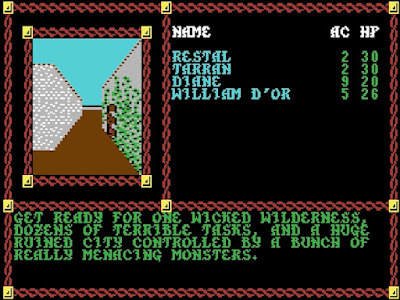Can You Go Home Again?

Despite my preference for playing RPGs with a group of friends, I've long enjoyed video and computer games. In fact, over the past Christmas holiday season, I finally completed Legend of Grimrock, a computer game I bought more than a decade ago and never finished. The premise of Legend of Grimrock is that the your party of four characters have been accused of crimes they (probably) didn't commit and must serve their sentence within the dungeons of Mount Grimrock. If they somehow survive its dangers, they will be absolved of their crimes. Of course, no one has ever escaped Mount Grimrock, so the odds of their doing so are not good.
I had a lot of fun with Legend of Grimrock (and, earlier this year, its sequel). It's a tough, occasionally frustrating dungeon whose challenges are a mix of puzzles, traps, resource management, and, of course, combat. In fact, I had such a good time playing it that I experienced a little bit of sadness when I finished the game. I wanted there to be more and there wasn't, so I naturally set out to find other games that might scratch the same itch. Surprisingly, there weren't a lot of computer or video games out there that had quite what I was looking for – at least not current video games (by which I mean, games released within the last decade or so).
Fortunately, fondness for and appreciation of the products of earlier eras is not limited to the realm of tabletop roleplaying games. Indeed, I suspect there is probably even more nostalgia for old video and computer games, if only because of their greater popularity and reach. In recent years, quite a few publishers have made their older games available once again, after making small updates so that they'll run on modern hardware. That's when the idea struck me: why don't I play one of those older games – go right back to "the source," so to speak? Surely that would help me over my feeling of letdown after completing Legend of Grimrock.
So, I picked up a copy of Pool of Radiance, a computer game for which I have fond memories. Not only was this the first computer game to make use of the Dungeons & Dragons rules, it came out during my time away at college. I never owned the game myself – I didn't yet have a computer, this being 1988 – but a friend of mine did. He kindly let me play it when he was in class and I recall enjoying myself. I never completed the game, so buying it now would give me the opportunity to do so, albeit thirty-six years after the fact.
Regrettably, it looks like I'll probably never finish Pool of Radiance.
The truth is that, for me, the game is too old, both in terms of its content and presentation, for me to enjoy. I suspected this might be the case, since, when I wrote my Retrospective piece back in October 2022, I had the chance to look at lots of screenshots and even the original manual. They reminded me that just how primitive the game is. Now, as an enjoyer of OD&D, there's nothing inherently wrong with primitive and, in fact, there can often be something very enjoyable about it. When it comes to technology, though, the matter is a bit more complicated, since it can be difficult to unlearn what you have already learned.
In the case of Pool of Radiance, its user interface is awkward and clunky, designed for use with computer hardware that no longer exists. Likewise, the graphics are often difficult to read/recognize on a modern computer monitor. That made doing almost anything in the game slow and unintuitive, thereby detracting from my enjoyment. Further, the game design is very tedious and grindy – almost as if the stereotype of old school tabletop RPGs were true! Rather than challenging my wits, the game challenged my patience and I soon found I was unable to play it with any pleasure.
It's a great shame, because I was looking forward to playing Pool of Radiance to its conclusion, after all these years. I wonder if the problems are really with the game itself or with me. It may simply be the case that I've grown so accustomed to the way modern games work that I can't get myself back into the headspace to appreciate older ones. If so, that makes me wonder if something similar might be going on with people who claim they can no longer play older tabletop RPGs. Is this a case where "technology," broadly defined, so alters our mental frames that it inhibits or even impedes our ability to make use of earlier versions of itself? I don't know if this is true, but it's a fascinating thought.
Regardless, I still don't have a good replacement for Legend of Grimrock. Any suggestions?
James Maliszewski's Blog
- James Maliszewski's profile
- 3 followers



